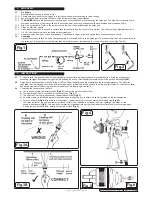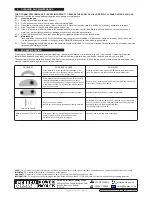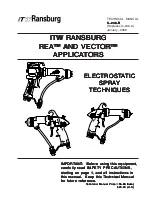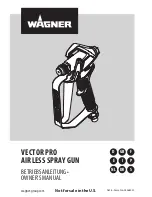
6. PROBLEM SOLVING
FOR OPTIMUM PERFORMANCE IT IS VERY IMPORTANT TO ENSURE THE SPRAY GUN IS CORRECTLY CLEANED AFTER EACH USE.
Disconnect from the air supply before attempting any cleaning or maintenance.
5.1. Cleaning the gun
5.1.1. flush the gun through with clean solvent.
5.1.2. use a bristle brush and solvent to wash off accumulated paint.
5.1.3. clean the air nozzle using a brush. Blow clean with air. Handle all nozzles carefully and do not make any alterations in the gun.
5.1.4. Wipe the outside of the gun with a dampened solvent rag.
5.1.5. If there is a need to probe the holes in the nozzles, ensure a tool that is softer than brass is utilised, under no circumstances use a
metal tool, as the slightest amount of damage will adversely affect the spray pattern.
5.1.6. Adjust the fluid needle valve so that when the gun is triggered, air flow occurs before fluid flow.
5.2. Maintenance
take care when re-assembling. screw parts hand tight to avoid cross-threading. If a part cannot easily be turned by hand, check that
it is the correct part, or unscrew it, realign and retry.
DO NOT
use excessive force when re-assembling.
5.2.1. When changing the nozzle size, ensure the complete nozzle set is fitted. this consists of air cap, fluid nozzle and paint needle. Insert the
fluid nozzle before paint needle.
5. CLEANING AND MAINTENANCE
Dried material in a side port restricts passage of air.
Greater flow of air from the clean side port forces a fan
pattern in the direction of the clogged side.
Dried material around the outside of the fluid nozzle tip
restricts the passage of atomizing air at one point
through the centre opening of the air nozzle and results
in the pattern shown. this pattern can also be caused
by a loose air nozzle.
Material too thin or atomization air pressure too high.
not enough paint in bottle.
nozzle set / seating dirty, damaged or loosely installed.
Material bubbles or “boils” in paint
cup.
Atomised air flowing through the paint channel to the
bottle. the paint nozzle is not sufficiently tight.
Air nozzle is not completely screwed on.
tighten, clean or replace parts accordingly.
Dissolve material in the side ports with solvent, then blow the gun
clean. Do not poke into the nozzles with metal instruments.
remove the air nozzle and wipe off fluid tip using a rag dampened
with solvent. tighten the air nozzle.
regulate material viscosity or reduce air pressure.
refill bottle. remove the fluid nozzle, clean the back of the nozzle
and the nozzle seat using a cloth dampened with thinner. refit the
nozzle and secure it tightly against the body.
If necessary replace nozzle set.
ProBLEM
PossIBLE cAusEs
soLutIon
A faulty spray is usually caused by improper cleaning or dried material around the fluid nozzle tip or in the air nozzle. If cleaning is required,
remove these parts and soak them in solvent. t his will soften the dried material which can then be removed with a brush or a cloth.
these parts are carefully machined and any damage to them will cause a faulty spray. If either the air nozzle or fluid nozzle are damaged, they
must be replaced before a perfect spray can be obtained.
Paint spray ‘flutters’
NOTE:
It is our policy to continually improve products and as such we reserve the right to alter data, specifications and component parts without prior notice.
IMPORTANT:
no liability is accepted for incorrect use of this product.
WARRANTY:
Guarantee is 12 months from purchase date, proof of which will be required for any claim.
INFORMATION:
for a copy of our latest catalogue and promotions call us on 01284 757525 and leave your full name and address, including postcode.
01284 757500
01284 703534
Sole UK Distributor, Sealey Group,
Kempson Way, suffolk Business Park
,
Bury st. Edmunds, suffolk,
IP32 7Ar
www.sealey.co.uk
Web
Original Language Version
HVLP731, HVLP741.V2, HVLP742 Issue: 2 - 12/10/09





















